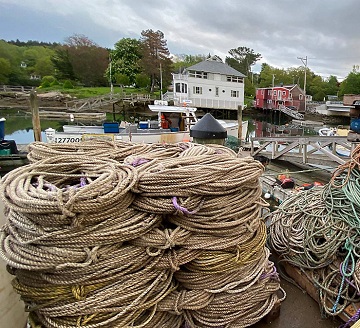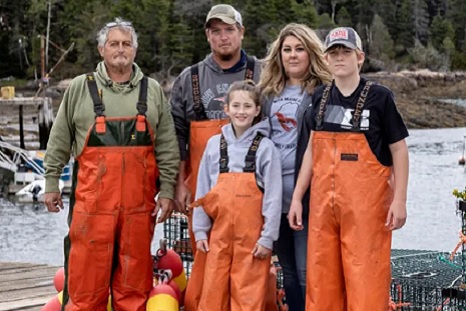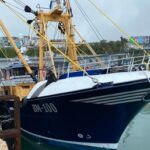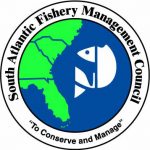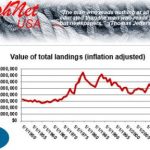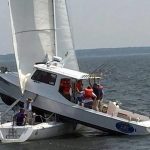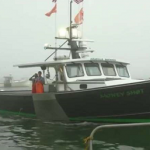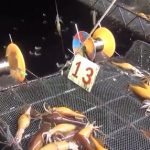Tag Archives: Patrice McCarron
A whale washed up dead. Greens blame a Democrat.
 Environmentalists say Chellie Pingree’s defense of the Maine lobster industry could imperil a critically endangered whale. Doing what greens want would likely send the Democrat to political extinction. Conservation advocates are publicly pressuring Pingree to overturn a law that protects Maine’s prized lobster fishery. The calls come after one of only 360 remaining North Atlantic right whales washed up dead in February entangled in Maine lobstering rope. “I think it is a little bit more of a black mark on an otherwise fairly good conservation record,” said Brett Hartl, the government affairs director at the Center for Biological Diversity, on Pingree’s support of the pro-lobstering law. It’s a rare rebuke of a longtime ally who has a near-pristine voting record on environmental issues. Pingree says she has no plans to reverse course, but the incident highlights how lawmakers continue to balance environmental concerns with the everyday lives of their constituents. more, >>CLICK TO READ<< 17:57
Environmentalists say Chellie Pingree’s defense of the Maine lobster industry could imperil a critically endangered whale. Doing what greens want would likely send the Democrat to political extinction. Conservation advocates are publicly pressuring Pingree to overturn a law that protects Maine’s prized lobster fishery. The calls come after one of only 360 remaining North Atlantic right whales washed up dead in February entangled in Maine lobstering rope. “I think it is a little bit more of a black mark on an otherwise fairly good conservation record,” said Brett Hartl, the government affairs director at the Center for Biological Diversity, on Pingree’s support of the pro-lobstering law. It’s a rare rebuke of a longtime ally who has a near-pristine voting record on environmental issues. Pingree says she has no plans to reverse course, but the incident highlights how lawmakers continue to balance environmental concerns with the everyday lives of their constituents. more, >>CLICK TO READ<< 17:57
Maine lobstermen made more money in 2023 despite catching fewest lobster in 15 years
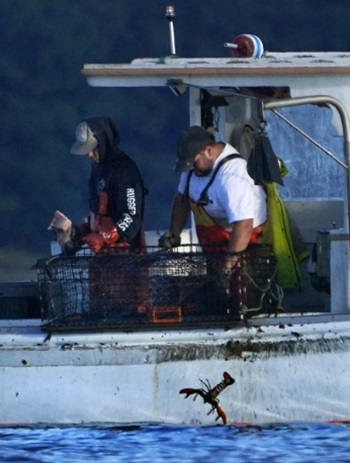 Maine lobstermen raked in $464.4 million at the docks last year, rebounding from the worst year the fishery had seen in a decade, according to an annual report from the Maine Department of Marine Resources released Friday. The dwindling number of landings isn’t necessarily a surprise, though. State officials and members of the lobstering community say the decrease reflects the impacts of high costs to operate the fishery last year. And the dip in poundage indicates how lobstermen navigated the challenging obstacles.“Fishermen are now very strategic about how they fish. Expenses are through the roof, so you can’t afford to be out if you’re not making money,” said Patrice McCarron, a lobsterman and policy director with the Maine Lobstermen’s Association. more, >>click to read<< 16:26
Maine lobstermen raked in $464.4 million at the docks last year, rebounding from the worst year the fishery had seen in a decade, according to an annual report from the Maine Department of Marine Resources released Friday. The dwindling number of landings isn’t necessarily a surprise, though. State officials and members of the lobstering community say the decrease reflects the impacts of high costs to operate the fishery last year. And the dip in poundage indicates how lobstermen navigated the challenging obstacles.“Fishermen are now very strategic about how they fish. Expenses are through the roof, so you can’t afford to be out if you’re not making money,” said Patrice McCarron, a lobsterman and policy director with the Maine Lobstermen’s Association. more, >>click to read<< 16:26
A treasured industry and an endangered species compete for survival
 On a cold morning in January, Chris Welch is already out preparing his boat. This time of year, his days begin before sunrise. It’s a ritual he’s grown accustomed to — at just 35 years old, he’s already spent decades working in the lobster business. “I started lobstering when I was six.” Welch said. Being a lobsterman in Maine is less of a job and more of a lifestyle. It’s a family business for many, including Welch, whose learned the ropes from his grandfather. But recently, the focus is less on what lobstermen’s ropes are pulling up and more on what may be running into them. Video, more, >>click to read<< 10:23
On a cold morning in January, Chris Welch is already out preparing his boat. This time of year, his days begin before sunrise. It’s a ritual he’s grown accustomed to — at just 35 years old, he’s already spent decades working in the lobster business. “I started lobstering when I was six.” Welch said. Being a lobsterman in Maine is less of a job and more of a lifestyle. It’s a family business for many, including Welch, whose learned the ropes from his grandfather. But recently, the focus is less on what lobstermen’s ropes are pulling up and more on what may be running into them. Video, more, >>click to read<< 10:23
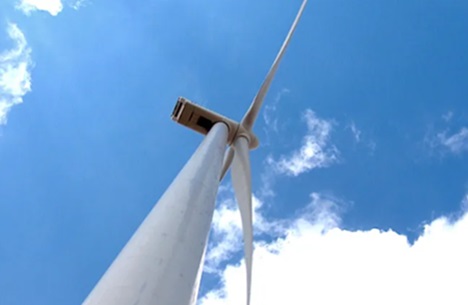
Fishermen in Maine lobbied to keep wind farms out of crucial fishing grounds. Will it happen in N.S.?
A no-compromise lobbying campaign by Maine lobster harvesters has helped keep wind farms out of a crucial lobster fishing area in the Gulf of Maine. And that has some fishermen in Nova Scotia casting an envious eye south of the border. “I’m pleased to see that happen in Maine. We’d like to see the same sort of diligence taken in Nova Scotia,” said Tommy Amirault, a fisherman from Pubnico and president of the Coldwater Lobster Association. “Maine obviously has concerns. It would be nice to 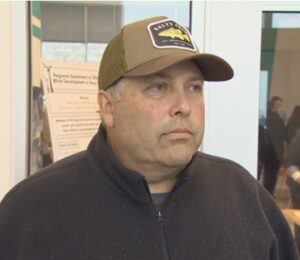 see both provincial and federal governments take our concerns into practice,” Amirault said. “We didn’t mince words that we opposed offshore wind anywhere in the Gulf of Maine. It’s one of the most productive ecosystems in the world. And we really didn’t think that this is the place to solve the renewable energy crisis,” said McCarron. In Nova Scotia, the process has just begun. He said it’s no surprise fishermen have concerns about where it happens. >>click to read<< 06:57
see both provincial and federal governments take our concerns into practice,” Amirault said. “We didn’t mince words that we opposed offshore wind anywhere in the Gulf of Maine. It’s one of the most productive ecosystems in the world. And we really didn’t think that this is the place to solve the renewable energy crisis,” said McCarron. In Nova Scotia, the process has just begun. He said it’s no surprise fishermen have concerns about where it happens. >>click to read<< 06:57
Maine State Chamber of Commerce puts spotlight on lobster
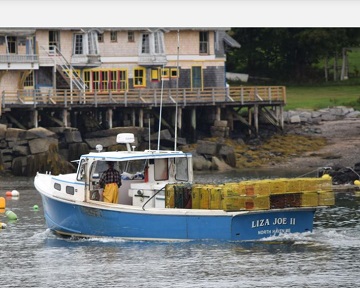 Maine lobster contributes $1.4 billion to the state economy and 4,000 jobs on the shore, from live lobster dealers to processors to workers on the piers. And those numbers don’t include lobster-based tourism, Linda Caprara, interim CEO of the Maine State Chamber of Commerce, noted Sept. 28 in an online panel discussion in honor of Maine Lobster Week. Then, there are the 5,000 licensed lobstermen and their crew who all earn their livelihood on the water. Last year, just below 100 million pounds of lobster landed on docks from Portland to Lubec with a value of about $390 million. “We’re catching a lot of lobster,” said Marianne LaCroix, executive director of the Maine Lobster Marketing Collaborative. >>click to read<< 08:51
Maine lobster contributes $1.4 billion to the state economy and 4,000 jobs on the shore, from live lobster dealers to processors to workers on the piers. And those numbers don’t include lobster-based tourism, Linda Caprara, interim CEO of the Maine State Chamber of Commerce, noted Sept. 28 in an online panel discussion in honor of Maine Lobster Week. Then, there are the 5,000 licensed lobstermen and their crew who all earn their livelihood on the water. Last year, just below 100 million pounds of lobster landed on docks from Portland to Lubec with a value of about $390 million. “We’re catching a lot of lobster,” said Marianne LaCroix, executive director of the Maine Lobster Marketing Collaborative. >>click to read<< 08:51
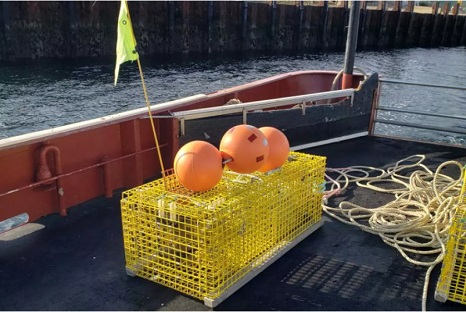
NOAA wants to expand ‘ropeless’ fishing gear pilot to include some Maine lobstermen
Last winter as part of a pilot project, some Massachusetts lobstermen were allowed to fish in areas that are seasonally closed to protect endangered North Atlantic right whales. But they had to use so-called “on-demand” or “ropeless” fishing gear and work with the National Oceanic and Atmospheric Administration to share their feedback. Now NOAA wants to expand the program to include lobster and other fixed-gear fishermen throughout New England. Federal officials have proposed issuing permits to more than 200 people, with priority given to those who fish closed areas during the winter. More than 100 people in Maine fish those closed areas. And fishermen aren’t thrilled with the idea of opening access to only some of them, said Patrice McCarron of the Maine Lobstermen’s Association — unless there’s enough on-demand gear to go around to everyone. >click to read< 10:00

BREAKING NEWS: U.S. COURT OF APPEALS RULES IN FAVOR OF MAINE LOBSTERMEN
Today, the U.S. Court of Appeals for the D.C. Circuit ruled overwhelmingly in favor of the Maine Lobstermen’s Association (MLA) in its appeal of a lower court ruling in Maine Lobstermen’s Association v. National Marine Fisheries Service. Following is initial reaction from Patrice McCarron, policy director for the MLA: “When the Maine Lobstermen’s Association (MLA) made the decision to sue the federal government, we knew it wouldn’t be easy, but we refused to go down without a fight. Today’s decision by the U.S. Court of Appeals is an overwhelming victory for lobstering families and the communities that rely on this industry, and it reaffirms what the MLA has been saying all along – the federal government does not have a blank check to use “worst case scenarios” and disregard actual data in its regulation of the Maine lobster fishery. >click to read and comment< 18:48
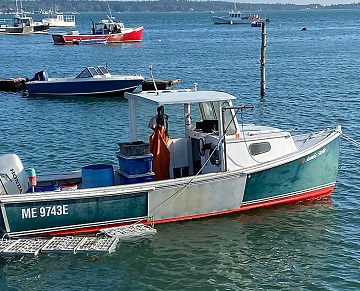
Maine bill to pay lobstermen to test new gear gets initial Senate approval
The bill seeks to set aside $1 million a year for the next two years to help lobstermen comply with federal regulations that could kick-in within six years. Following the Senate vote on Tuesday, bill sponsor Sen. Eloise Vitelli (D-Arrowsic) said federal regulators have “targeted Maine’s lobster industry as a scapegoat.” “The bipartisan fight against these untenable regulations is ongoing,” she said in a statement. “This bill will help make sure that lobstermen are prepared for what might be on the horizon.” Vitelli’s bill, which faces additional House and Senate votes, would provide stipends to reimburse lobstermen for time they spend testing gear. >click to read< 09:05
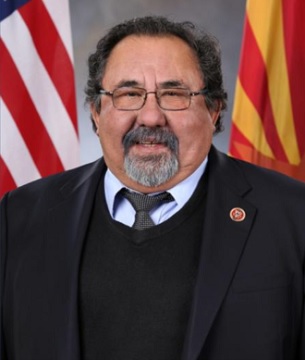
Maine delegation to fight bill that would repeal ‘pause’ in lobstering regulations
When Congress passed a law in December that included a six-year reprieve from new federal regulations for the lobster industry, the fishery heaved a sigh of relief. But if a new bill introduced this week in the House of Representatives is approved, that relief would be short-lived. Maine’s congressional delegation says they are committed to ensuring that doesn’t happen. On Monday, Rep. Raul Grijalva, D-Arizona, introduced The Restoring Effective Science-based Conservation Under Environmental Laws Protecting Whales Act, or the RESCUE Whales Act. If passed, the bill would repeal the protections for the lobster fishery that were included in the 2022 federal omnibus spending law. The omnibus poses an “existential threat” to the North Atlantic right whale, undermines the science-based protections of both the Endangered Species Act and the Marine Mammal Protection Act, and ignores possible solutions like “ropeless gear,” Grijalva said in a statement. >click to read< 11:31

Biden Administration sued by Massachusetts lobstermen for closing waters to protect endangered whales
Massachusetts lobster fishermen have filed a lawsuit against the Biden administration over its closure of fishing grounds done with the intention of protecting an endangered species of whale. The lawsuit stems from the February 1 closure of 200 square miles of the Massachusetts Bay that will prevent lobster fishing until the end of April in a move that the National Oceanic and Atmospheric Administration says was necessary to protect the North Atlantic right whales from being tangled in fishing ropes. Video, >click to read< 08:02

Maine Lobstermen’s Association Statement on Omnibus Appropriations Bill
12/20/2022 -Today, U.S. Senators Susan Collins and Angus King, Representatives Chellie Pingree and Jared Golden, and Governor Janet Mills announced that they were successful in securing a regulatory pause for Maine’s lobster industry in the Omnibus funding package that is expected to pass the Senate and House this week. Following is a statement from Patrice McCarron, Executive Director of the Maine Lobstermen’s Association: “The Maine Lobstermen’s Association (MLA) is encouraged that Congress recognizes that the federal rulemaking process intended to protect right whales is broken. Please >click to read the statement< The comment section is open.16:09
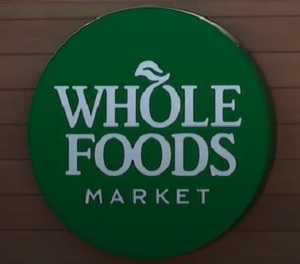
Whole Foods to stop selling Gulf of Maine lobster
The Marine Stewardship Council suspended the certification of sustainability for the fishery last week, citing a failure to comply with laws meant to protect the North Atlantic right whale. The fishery was also added to the Monterey Bay Aquarium’s “red list” in September due to the same fishing practices which the seafood watch program deems harmful. Whole Foods says it will stop buying Gulf of Maine lobster until the suspension is lifted or the fishery is taken off the red list. The Maine Lobstermen’s Association feels the MSC decertification is the “direct result of the federal government’s overreach and its misuse of science in overestimating risk from the Maine lobster fishery,” >click to read< 08:25

Maine Lobstermen’s Association Statement on Recent Court Decision
On November 17, Judge James Boasberg issued a remedy order in the lawsuit, Center for Biological Diversity v. Raimondo. Following is a statement from Patrice McCarron, executive director of the Maine Lobstermen’s Association. “While the Court’s decision offers lobstermen some hope, it by no means resolves the issues facing our industry. We appreciate that the Judge recognizes the need to avoid massive disruption of the fishery, but the simple truth is lobstermen are still mandated to achieve a 90% risk reduction in 2 years which cannot happen without causing significant harm to the fishery. Please >click here to read the press release< 10:12

Maine lobster group backs new speed limit on ships to protect whales
A proposal to expand speed limits along the East Coast might have little impact on vessels off Maine and is not directly linked to two lawsuits over pending federal regulations for the state’s lobster fishery. Still, the groups involved in that litigation recently weighed in on the speeding proposal, which is part of broader efforts to save right whales from extinction. The Maine Lobstermen’s Association and four conservation groups supported the stricter limits but took issue with other aspects of the rules and reiterated the priorities that have driven their court battles. >click to read< 09:31

Lobster harvesters worry about survival of their livelihoods
The state’s lobster industry is bracing as federal regulators consider additional requirements they claim are needed to protect the endangered North American right whale, proposals many fear could spell doom for the industry and the coastal communities that it supports. Squaring off in this battle are national environmental and animal rights organizations versus Maine and its lobster harvesters. The legal war began in January 2018 when the Center for Biological Diversity, the Defenders of Wildlife, the Humane Society of the United States, and the Conservation Law Foundation filed a lawsuit in the U.S. District Court of D.C. against the U.S. Department of Commerce and the NOAA. The environmental and animal rights groups claimed the federal agencies had not done enough to protect the North Atlantic right whale from lobster harvesting. >click to read< 12:42

Maine lobstermen appeal federal judge rejection of lawsuit
The Maine Lobstermen’s Association is appealing a federal judge’s ruling that rejected a lawsuit aimed at blocking new regulations designed to protect the endangered North Atlantic Right Whale. The appeal goes to the United States Court of Appeals for the District of Columbia Circuit. In announcing their appeal Monday morning, the MLA said the regulations would “cripple” Maine’s lobster industry, calling the regulations “draconian and fundamentally flawed.” >click to read< 09:42
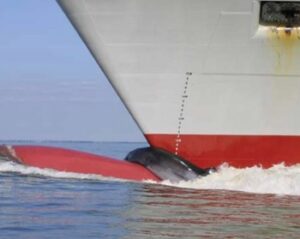
Ship Strikes: Ships must slow down more often to save whales, feds say
Vessels off the East Coast must slow down more often to help save a vanishing species of whale from extinction, the federal government said Friday. Efforts to save the whales have long focused on fishing gear, especially that used by East Coast lobster fishermen. The proposed vessel speed rules signal that the government wants the shipping industry to take more responsibility. “Changes to the existing vessel speed regulation are essential to stabilize the ongoing right whale population decline and prevent the species’ extinction,” state the proposed rules, which are slated to be published in the federal register. Fishermen are unfairly being held accountable for whale deaths that occur due to vessel strikes, said Patrice McCarron, executive director of the Maine Lobstermen’s Association, which is the largest fishing industry association on the East Coast. >click to read< 11:33

Statement from Maine Lobstermen’s Association on Court Ruling
Below is a statement from the Maine Lobstermen’s Association following today’s decision in a lawsuit filed by the Center for Biological Diversity. The Maine Lobstermen’s Association (MLA) will not allow this industry to go down without a fight. Today’s ruling from the U.S. District Court for District of Columbia is a mixed bag but clearly demonstrates why it’s more important than ever for MLA to have the financial resources to continue this battle. >click to continue< 21:01

Maine lobster industry may receive nearly $14 million in federal aid
U.S. Reps. Jared Golden and Chellie Pingree, both Democrats from Maine, helped secure the funding and pledged to keep advocating for the fishery. In a statement, Golden called the regulations misguided, indefensible and economically damaging. “NOAA has been unable to prove that these regulations will work, but lobstermen are still being forced to pick up the tab,” he said. “It’s just wrong.” Virginia Olsen, director of the Maine Lobstering Union, said the money will help keep fishermen in business as they “work to right the wrongs” of the new regulations. Patrice McCarron, executive director of the Maine Lobstermen’s Association, agreed. >click to read< 19:58
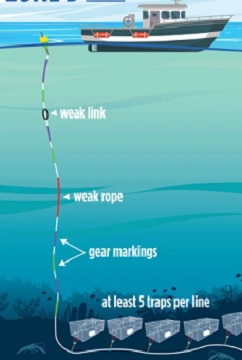
Big Story: Lobstermen fear disaster as new gear regulations take effect
Doug McLennan isn’t worried about the state of the fishery. What worries McLennan and thousands of other Maine lobstermen is the latest round of federal regulations designed to protect the endangered North Atlantic right whale, and additional measures being planned for the next decade. The newest regulations took effect Sunday, though their enforcement has been delayed until supply chain issues for some of the required gear are resolved. This is just the latest in gear regulation change required by the Atlantic Large Whale Take Reduction Plan,,, Many lobstermen have raised concerns about safety and the potential for gear failure and loss of expensive traps under the new rules, and they worry about what is coming next. >click to read< 09:16

Are the whales leaving with the food? Gulf of Maine research raises questions about new lobstering rules
As the Gulf of Maine’s waters warm, recent studies show the main food source of the endangered North Atlantic right whale is moving north, out of Maine waters. And the whales appear to be following them. Such findings haven’t escaped the notice of the Maine lobster industry, which has been referencing them in its legal arguments as to why impending new federal restrictions on lobstering gear won’t help save the whales. Oceanographer Jeffrey Runge, of the University of Maine and the Gulf of Maine Research Institute, said the lipid-rich copepods have been abundant in the Gulf of Maine since Henry Bigelow did his first oceanographic surveys in the early 20th century, but that abundance has dropped by about 70 percent in the past 20 years. >click to read< 11:57

Lobstermen’s group stresses connection to Maine tourism as new whale regulations approach
The head of the Maine Lobstermen’s Association spoke at the Maine Restaurant & Lodging Expo in Portland Wednesday about threats she said could erase Maine’s lobster industry and hurt the hospitality industry along with it. Association Executive Director Patrice McCarron said the lobster industry is a driver of local economies, with 4,800 vessel owners running independent small businesses, and collectively providing 10,000 jobs on the boats alone, many of those jobs irreplaceable in remote coastal areas. And the industry is booming,,, “With all that’s going so well for us, how could we possibly be looking at our fishing heritage being erased?” McCarron asked the audience. “The reason for that is the North Atlantic right whale.” >click to read< 07:50

“I guess they’re too weak.” Weak lobstering gear recalled as new whale regs approach
The weak link made by Plante’s Buoy Sticks was pulled off shelves by the company this week, taking away one of the handful of gear options at lobstermen’s disposal to meet new federal rules that go into effect May 1. One retailer said their shop was told the links were believed to be breaking too easily. Plante’s links are one of three models approved by NOAA,,, Virginia Olsen, Maine Lobstering Union, said she sent a notice to her members about the issue and hoped the recall would prompt NOAA to review allowing fishermen the easier option of putting knots in their ropes to make them weaker. “It truly would be a great assistance to us if those knots were acceptable,” she said. >click to read< 14:21
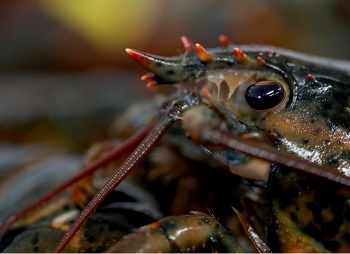
Federal windfall won’t put a stop to state lobster industry relief bills
Although Maine’s lobster industry is set to receive $17 million in federal funding as part of the 2022 omnibus spending package, it is unlikely to affect two bills going through the Legislature that seek more than $30 million in state funds for the industry. The spending bill will bring more than $200 million in funding for projects across the state. For the lobster industry, it includes $14 million to help lobstermen comply with new federal regulations intended to protect endangered North Atlantic right whales, set to take effect May 1, along with $760,000 for the Department of Marine Resources to conduct outreach and education among lobstermen, and $2.3 million for right whale research, monitoring and conservation. >click to read< 17:28
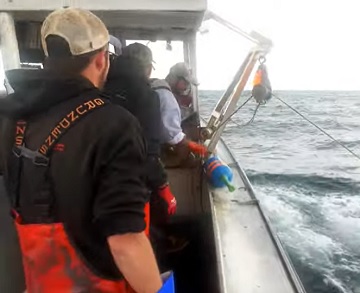
Save the Gulf of Maine – The Maine Reset, Ep. 4: Never Forgotten
Derek Colbeth grew up lobstering, and then served for 5 years in the US Marine Corps. Now he’s a civilian again, but his heritage and livelihood is under attack on all fronts. Powerful interests are converging in a war against Maine Lobstermen. If Lobstermen lose this fight, Maine will never be the same. >Video, click to watch< 14:35
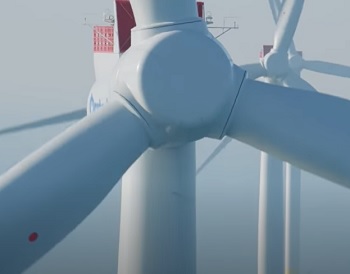
Save the Gulf of Maine – The Maine Reset, Ep.3: This is an Experiment
In this episode, interviews with two brilliant people that you won’t want to miss regarding offshore wind development in Maine. Carla Guenther PhD brings an oceanography perspective, and Long Island Commercial Fisherman Steve Train lays out some practical wisdom as only a fisherman can. Sandwiched in there are some of my own antics lampooning the empty suits from corporations who want to confiscate our ocean., >Video, click to watch< 13:15 ocean industrialization

Maine considers fund for lobster fishermen/gillnetters hurt by whale rules
Maine is by the far the most significant lobster fishing state in the country, and members of the state’s industry have warned they will suffer because of the new rules. A proposal from Democratic Rep. Holly Stover of Boothbay would create the fund, which would provide grants for lobster fishermen as well as some fishermen who harvest other species with gillnets. “The lobster industry is an economic driver of our local economy, hands down,” Stover said. “This is not a fisheries disaster, this is an economic disaster.” >click to read< 11:18






